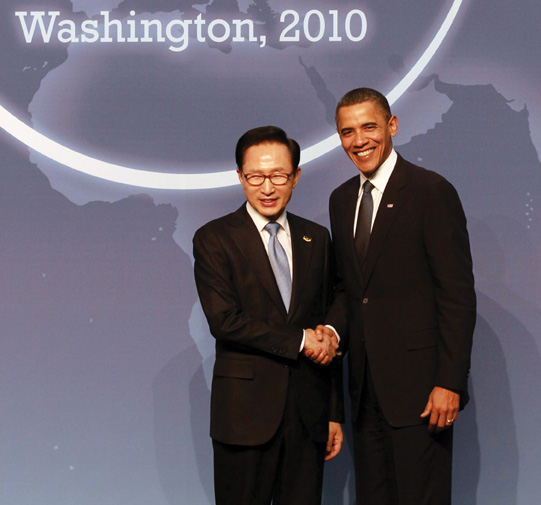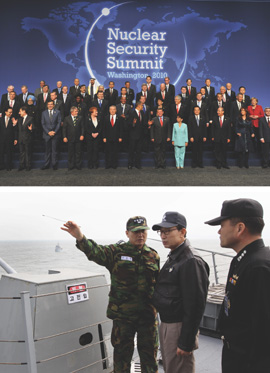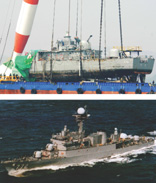Korea to Host 2nd Nuclear Security Summit
Ship sinking poses a threat to security on the peninsula
 Korea was chosen as the host of the 2nd Nuclear Security Summit slated for 2012 during the first such summit held in Washington, D.C., on April 13. This will likely enhance Korea¡¯s status in the international community as the decision comes on the heels of the announcement that the nation will host the G-20 Summit in November in Seoul.
Korea was chosen as the host of the 2nd Nuclear Security Summit slated for 2012 during the first such summit held in Washington, D.C., on April 13. This will likely enhance Korea¡¯s status in the international community as the decision comes on the heels of the announcement that the nation will host the G-20 Summit in November in Seoul.
After U.S. President Barack Obama declared the opening of the summit and explained the purpose of the meeting, he designated Korea as the host of the Second Nuclear Security Summit, which was unanimously approved by the participating leaders. President Lee Myung-bak responded by shaking hands with President Obama and accepting the honor.
In the first session of the summit held in the morning, President Lee took the podium as the first presenter to introduce Korea¡¯s measures for the physical protection of nuclear materials, the agenda topic of the first session. He also laid out what contributions Korea would make to the international community. 
Significance of Korea¡¯s Hosting of the Nuclear Security Summit
The United States and other participating nations at the summit actively supported Korea¡¯s hosting of the next Nuclear Security Summit considering the following two points: Korea has complied with the Nuclear Non-Proliferation Treaty in good faith and followed other related international norms, setting an example of utilizing nuclear power for peaceful purposes. And secondly, the Korean Peninsula is extremely significant in terms of resolving nuclear issues.
Among other things, the positive role of the United States has been of great help in Korea¡¯s hosting of the next summit. The close Korea-U.S. alliance as well as the profound trust and cooperative ties between the two presidents were reflected in the decision.
The 2012 Nuclear Security Summit will serve as a significant opportunity to examine in a concrete manner the world¡¯s interest in and commitment to nuclear security forged at the inaugural summit this year. On the occasion of the 2012 Summit, Korea will be able to widely publicize the superiority of its nuclear technologies in terms of safety, thereby further cementing the groundwork for the domestic nuclear industry to make inroads into overseas markets.
Since Korea is directly involved in trying to solve the issue of North Korea¡¯s nuclear weapons program, the hosting of the next summit is expected to achieve various effects. For one, it is expected to help rally the international community to make a stronger commitment to resolving the North Korean nuclear problem. Korea¡¯s hosting of the 2012 Nuclear Security Summit along with the November 2010 G-20 Summit demonstrates that Korea¡¯s status and prestige is rising in the international community, as the G-20 meeting is the world¡¯s premier economic consultative body and the Nuclear Security Summit is the highest-level conference for global nuclear security.
The first Nuclear Security Summit in Washington was the largest gathering of world leaders hosted by the United States in recent history, and the second meeting in Korea promises to be the largest summit Korea will have hosted in its history. As the host of the 2012 Summit, the Korean Government will make certain that all participating countries will be able to examine the implementation of the measures they committed to at the Washington Nuclear Summit while assisting them in establishing new goals. In the course of preparation, it will also make leading contributions to establishing a substantial agenda for the Second Nuclear Security Summit.
Preparation for the 2012 Nuclear Security Summit
The Korean Government will make thorough preparations for the 2012 Nuclear Security Summit in consultation with other major nations, including the United States, the host of the first Summit.
To ensure the complete success of the 2012 Nuclear Security Summit, all government ministries and agencies will be involved in the preparation efforts. In addition, working-level officials from participating governments will hold meetings at least four times a year. The exact dates, places and other relevant matters will be made public as preparations progress.
Cheong wa Dae to pursue balanced diplomacy in view of naval ship sinking
Cheong wa Dae has also been seeking a cautious approach in dealing with the sinking of the Navy frigate Cheonan as it will have far-reaching implications on security surrounding the Korean Peninsula.
There has been wide speculation that North Korea might have attacked the vessel, plunging the Korean government into a serious dilemma regarding future steps to deal with the case.
The resumption of the stalled six-party negotiations on the North¡¯s nuclear ambition will likely be postponed further until there is a conclusion on the cause of the ship sinking, which took place in waters near the border with North Korea. nw
Korean President Lee Myung-bak shakes hands with U.S. President Barack Obama in Washington D.C. on April 12 prior to the 1st Nuclear Security Summit.
(from top) The heads of state participating in the 1st Nuclear Security Summit pose for a group photo on April 13.
President Lee Myung-bak is being briefed on the sinking of the Navy frigate Cheonan while visiting the site of the incident off Baeknyeong Island in the West Sea on March 30.
Th stern of the Cheonan, believed to have been attacked by North Korea, is being hauled out of water.
A view of the cruising frigate before it sank.
3Fl, 292-47, Shindang 6-dong, Chung-gu, Seoul, Korea 100-456
Tel : 82-2-2235-6114 / Fax : 82-2-2235-0799